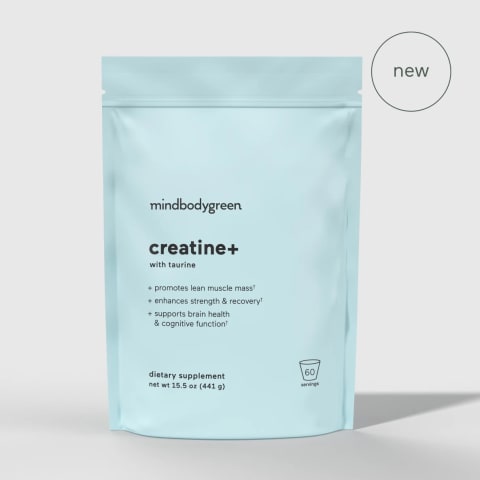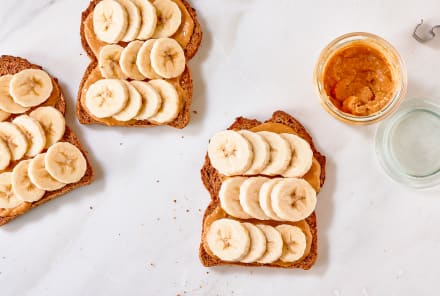Advertisement
New Study Shows That Body Composition Affects Your Risk Of Alzheimer's & Parkinson's Disease


Brain aging is highly influenced by lifestyle. Certain foods (like processed meats), low vitamin D levels, and even moderate alcohol consumption can increase your risk of Alzheimer's disease. More and more research is coming out about how body composition (levels of fat vs. lean mass) impacts cognitive diseases.
A new study published in the American Academy of Neurology shows that where you store fat can increase your likelihood of developing Alzheimer's and Parkinson's disease. Conversely, they also found that stronger folks were less likely to develop these conditions. Here's what you need to know.
Storing fat in these areas is linked to Alzheimer's
So in this study, researchers followed 412,690 people from the UK Biobank cohort (mainly white individuals with an average age of 56) without preexisting cognitive conditions for nine years.
At the start of the study, researchers collected measurements including waist and hip circumferences, grip strength, bone density, and lean and fat mass. And the goal was to see how many people developed dementia (mainly Alzheimer's disease) or Parkinson''s after nine years.
By the end of the study, they found
- People with high levels of belly fat were 13% more likely to develop these neurological diseases.
- People with high levels of arm fat were 18% more likely to develop them.
- Strength seems to be protective of neurodegenerative diseases.
Strength seems to be protective of neurodegenerative diseases
What's interesting is that people with higher muscle strength were 26% less likely to develop these cognitive diseases than those with poor strength.
Strength was measured in this study with a grip strength test. Grip strength is an important indicator of longevity1 and is a good proxy for overall muscle strength (even though it just directly measures a group of muscles in the hands, wrists, and forearms).
How is body composition tied to brain health?
Now, researchers of this study cited that body composition and strength are tied to brain health through modifying risk factors for cardiovascular disease (which aligns with past research).
They specifically note that carrying excess weight in the abdomen interferes with insulin signaling, leaving blood sugar levels higher than they should be. This in turn can signal inflammation, which over time can damage blood vessels.
Optimal blood flow to the brain2 is so important for delivering oxygen and nutrients to the organ. The thing is, the blood vessels are tiny and very susceptible to damage. So, protecting your heart and vascular health also protects your brain.
Tips to improving your body composition
Now, you can't always control where your body stores fat (there is a genetic component here). Some people (women especially) are more likely to store it in their hips or lower body3 until they reach menopause. And postmenopausal women and men are more likely to store fat in their abdomens.
But it is possible to improve your body composition—no matter your age or genetic predispositions.
- Take up strength training: You can't build muscle or strength without lifting, pushing, or pulling heavy things (body weight still counts, though!). And that's where strength training comes in. The more muscle you have, the higher your metabolic rate (aka your calorie burn), and the more it will help you shed excess fat. Having more lean mass also improves blood sugar control and cholesterol levels—both of which are good for your heart and brain. If you're not sure where to start, check out our at-home strength training guide.
- Eat more protein: Eating protein also stimulates muscle protein synthesis, and it's recommended to pair a high-protein diet with strength training for maximal body composition benefits. Even on its own, a high-protein diet can help you lose fat (while still eating a lot of food), as it increases your calorie burn and promotes satiety. So, what does a high-protein diet look like? For most, that's a minimum of 100 grams a day, but many people need more. Find out how to calculate your protein needs here.
- Try a creatine supplement: To really get an edge on your strength training program and high-protein diet, consider taking a creatine supplement. Taking 5 grams a day (usually just one small scoop) can help you build muscle, lose fat, and improve your entire body composition. (Women are loving this creatine powder to tone their muscles.) Not to mention taking 10 grams a day is associated with brain health benefits4 like improved memory and cognition.
The takeaway
Body composition is becoming an increasingly important predictor of health5—more so than solely looking at weight. Studies like this show that it's not always what you have to lose; it's focusing on what you can gain. Gaining muscle and building strength is one of the best things you can do for your brain (and your health in general).
5 Sources
- https://www.bmj.com/content/361/bmj.k1651
- https://www.ncbi.nlm.nih.gov/pmc/articles/PMC6198802/
- https://www.cambridge.org/core/journals/british-journal-of-nutrition/article/sex-differences-in-fat-storage-fat-metabolism-and-the-health-risks-from-obesity-possible-evolutionary-origins/00950AD6710FB3D0414B13EAA67D4327
- https://www.ncbi.nlm.nih.gov/pmc/articles/PMC6093191/
- https://pubmed.ncbi.nlm.nih.gov/34444653/

5 Subtle Signs You Might Be Low In Omega-3 Fats & What To Do About It
Molly Knudsen, M.S., RDN

This Antioxidant-Rich Fruit Is A+ For Sleep & Recovery, Research Shows
Molly Knudsen, M.S., RDN

Which Is Healthier: One Drink Daily Or A Few Drinks On The Weekend?
Molly Knudsen, M.S., RDN

5 Subtle Signs You Might Be Low In Omega-3 Fats & What To Do About It
Molly Knudsen, M.S., RDN

This Antioxidant-Rich Fruit Is A+ For Sleep & Recovery, Research Shows
Molly Knudsen, M.S., RDN

Which Is Healthier: One Drink Daily Or A Few Drinks On The Weekend?
Molly Knudsen, M.S., RDN

5 Subtle Signs You Might Be Low In Omega-3 Fats & What To Do About It
Molly Knudsen, M.S., RDN

This Antioxidant-Rich Fruit Is A+ For Sleep & Recovery, Research Shows
Molly Knudsen, M.S., RDN

Which Is Healthier: One Drink Daily Or A Few Drinks On The Weekend?
Molly Knudsen, M.S., RDN

5 Subtle Signs You Might Be Low In Omega-3 Fats & What To Do About It
Molly Knudsen, M.S., RDN

This Antioxidant-Rich Fruit Is A+ For Sleep & Recovery, Research Shows
Molly Knudsen, M.S., RDN

Which Is Healthier: One Drink Daily Or A Few Drinks On The Weekend?
Molly Knudsen, M.S., RDN













